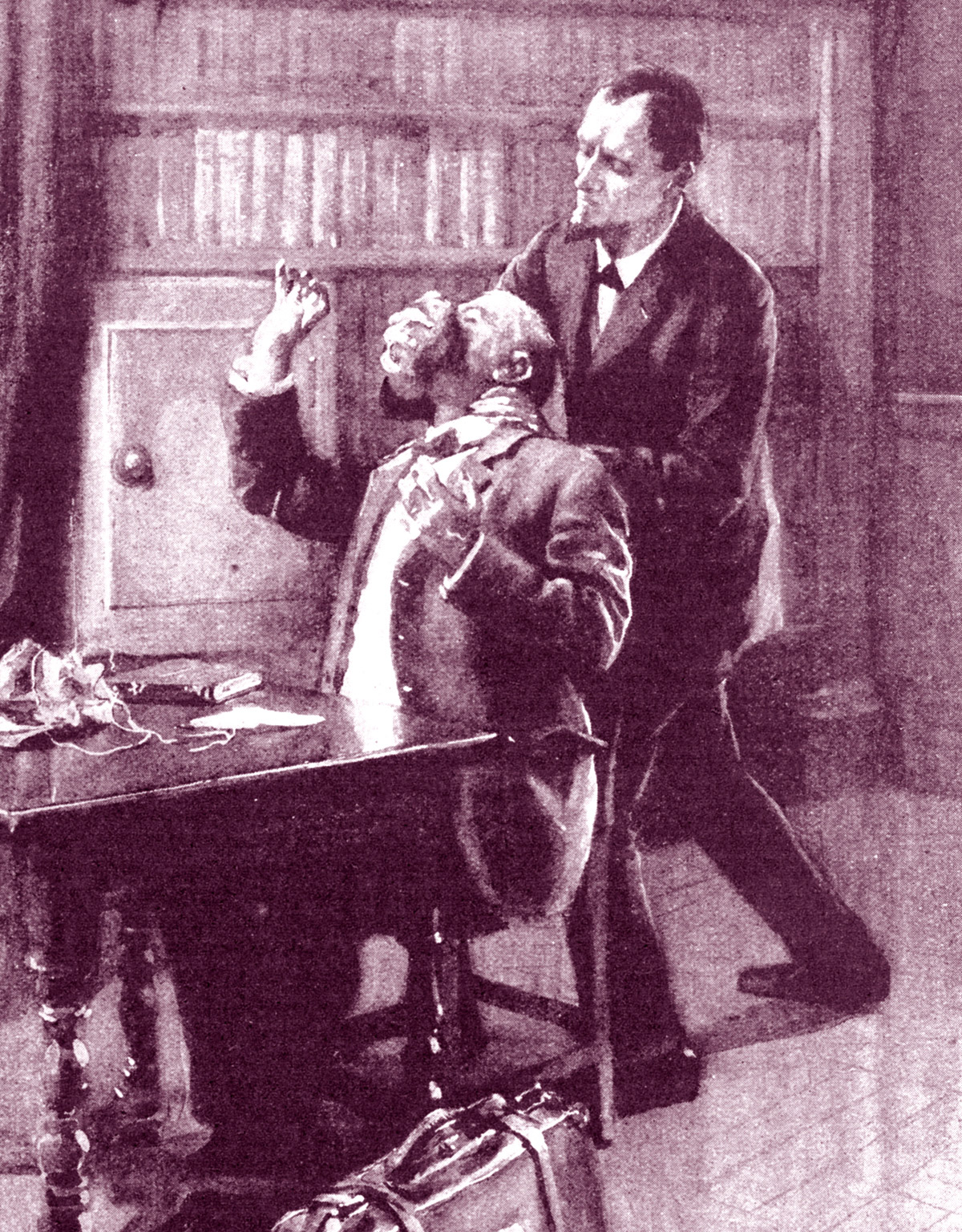
IN CONTEXT
Short story
UK: September 1917
US: September 1917
His Last Bow, 1917
Von Bork Avid sportsman and a German spy.
Martha Von Bork’s servant.
Baron Von Herling Chief Secretary of the German legation to London.
Altamont Anti-British, Irish American informant.
So great is Sherlock Holmes’s popularity it is often forgotten that Conan Doyle received his knighthood for his role as a reporter in the Boer War rather than for the creation of the world’s favorite detective. Indeed, the author could never quite escape Holmes. In his World War I account A Visit to Three Fronts (1916), Conan Doyle records being asked by a French officer whether Holmes was in the British Army. “Mon général,” replied Conan Doyle, “he is too old to serve.” However, it is clear that he soon reconsidered this. Published in 1917, “His Last Bow” documents the now-retired detective’s undercover military activities, and, chronologically, its 1914 setting features Holmes’s final appearance anywhere in the canon. Originally, the story was subtitled “The War Service of Sherlock Holmes,” but this was dropped from later editions.
It is also one of only two tales written in the third person, the other being “The Adventure of the Mazarin Stone”, published four years later. This might have been an intentional decision by the chronicler, Watson; as in “The Problem of Thor Bridge” he makes passing reference to cases in which he “was either not present or played so small a part that they could only be told as by a third person.”

Using chloroform, Holmes subdues the German agent, Von Bork—shown here in a Strand Magazine illustration by Alfred Gilbert—before bundling him into the back of his car, set for London.
An ominous moment
The language of the opening lines, “It was nine o’clock at night upon the second of August—the most terrible August in the history of the world,” is unusually ominous, and the doom-laden atmosphere can be explained by the date, for August 2, 1914 saw a war-bound Germany deliver its ultimatum to Belgium, overthrow Luxembourg, and sign a secret alliance with Turkey. Russia invaded Prussia that same day, and Britain declared war on Germany only two days later.
At his country house in England, Von Bork—a German spy—is in conversation with his superior, Baron Von Herling. In expectation of the approaching conflict, Von Bork is preparing to leave the country. Von Herling suggests this may not be necessary, since he feels England is unprepared for war and distracted by domestic troubles, particularly Ireland. Most of Von Bork’s family and staff have already departed, leaving only his servant Martha, of whom Von Herling remarks contemptuously, “She might almost personify Britannia, with her complete self-absorption and general air of comfortable somnolence.”
Deep undercover
After Von Herling leaves, Von Bork’s star informer—an anti-British, Irish American man named Altamont—arrives to deliver what is supposed to be a stolen copy of the British Navy’s secret signals. Von Bork boasts to Altamont about his safe, which is filled with secret intelligence. Its combination code, “August 1914,” set four years earlier, indicates that the Germans had been plotting the beginning of the war for some time.
On opening the package containing the book, Von Bork is stunned to see a copy of Practical Handbook of Bee Culture, but before he can react, Altamont leaps up and knocks him out with a chloroform-soaked rag. Thrillingly, it is then revealed that Altamont is none other than Holmes in disguise, whisked out of his beekeeping retirement two years earlier to scupper the troublesome German. As he and his “chauffeur,” Watson, help themselves to Von Bork’s wine, Holmes explains that Martha (whom some Holmesians believe is Mrs Hudson) was in on the secret, and he had spent two years undercover (including some time in the US) to prepare for his dealings with the spy. The similarities with Birdy Edwards in The Valley of Fear, published a month later, are striking.
Holmes is notably even-handed with Von Bork when he wakes, characterizing his brand of patriotic benevolence perfectly. However, the tale ends with a note of warning, with the detective voicing Conan Doyle’s own feelings about the menace of Germany: “There’s an east wind coming… such a wind as never blew on England yet. It will be cold and bitter, Watson, and a good many of us may wither… But it’s God’s own wind none the less, and a cleaner, better, stronger land will lie in the sunshine when the storm has cleared.”
"Stand with me here upon the terrace, for it may be the last quiet talk that we shall ever have."
Sherlock Holmes
WARTIME ESPIONAGE

Contrary to public concern, there was little German espionage in Britain during World War I. Only 31 German spies were brought to trial, 11 of whom were executed at the Tower of London. In “His Last Bow,” Von Herling implies that Germany had a hand in stirring up trouble in Ireland and inciting the suffragettes. While there is no evidence for the latter, German support of the Irish campaign for “home rule,” to weaken British power, is well documented. A key figure was the Irishman Roger Casement (pictured), whose courting of German support led Germany to supply arms for the 1916 Easter Rising. Casement, who knew Conan Doyle and his writing, helped put an end to Belgium’s ruthless colonial exploitation of the Congo. He was later denounced for homosexuality before being tried for high treason and executed by the British in 1916 as a persona non grata. Even Conan Doyle’s intervention could not save him.
